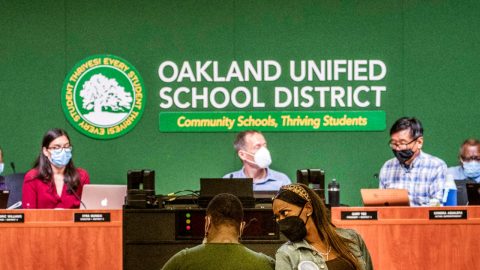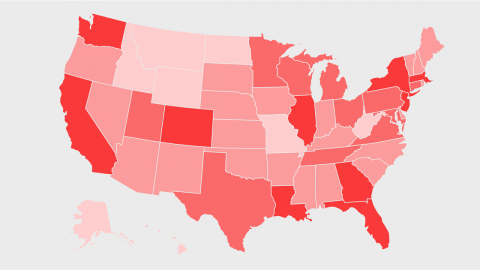
Spanish-speaking Latino households trying to reach Florida’s Medicaid call centers are facing hours of delays, new research shows, jeopardizing their ability to provide crucial information that may prevent them from being kicked out of the federal insurance program.
Research from UnidosUS, the nation’s largest Hispanic civil rights advocacy organization, first shared with NBC News, shows that an average Spanish-language caller had to wait nearly four times longer than an English-language caller to be able to speak to a representative at Florida’s Medicaid call center. And that’s if their call wasn’t dropped.
Almost one third (30%) of all Spanish-language calls were disconnected before the caller reached a representative, compared to 10% of English-language calls, according to the report published Thursday.
More than 400,000 Floridians have lost coverage since Covid-era protections ended in March, and more than half (55%) were unenrolled due to “procedural reasons,” not because they were found ineligible, according to the health research nonprofit KFF.
Spanish-speaking Latino families who have been unenrolled or are on the verge of being dropped from Medicaid have found it nearly impossible to plead their cases to the state because of “long and discriminatory delays” at Florida’s Medicaid call center, according to the report.
“They’re losing coverage simply because of missing paperwork or other bureaucratic factors,” Stan Dorn, director of the health policy project at UnidosUS, told NBC News.
The research shows that the average English-language caller faced a waiting time of 36 minutes, while average Spanish-language callers had to wait almost two and a half hours.
The Florida Department of Children and Families, which determines Medicaid eligibility, did not immediately respond to a request for comment.
Dorn, the report’s main author, called the numbers “shocking.”
“One big reason why so many people in Florida are losing their health care is because they simply can’t get through at the Medicaid call center to renew their children’s coverage,” Dorn said.
Roadblocks for low-income children
Three million out of the roughly 5 million people who rely on Florida’s Medicaid program are children, and more than a third are Hispanic.
Tamara Alea, 47, and her 18-year-old son are among the hundreds of thousands of Floridians who have been dropped from Medicaid this year.
She first enrolled her son on Medicaid six years ago after he moved from Cuba. As a single mother, Alea was also granted access to Medicaid.
Access to affordable health care was crucial for Alea, a construction worker who is a cancer survivor and has rheumatoid arthritis and a thyroid condition. Medicaid also helped her son get treatment for pityriasis versicolor, a common fungal infection that causes discolored patches of skin.
Alea received a letter about a month ago from the Florida Department of Children and Families requesting information needed to renew her coverage. The letter claimed she didn’t qualify for Medicaid because her salary had gone up, but her son, who is a full-time student, was able to remain in the program, she said.
When the department doesn’t get the information needed within 30 days, families are dropped from Medicaid, Dorn said. Once unenrolled, families have 90 days to provide the information needed to reinstate their Medicaid, a process that can take months.
Shortly afterward, Alea received another letter threatening to remove her son from Medicaid if he didn’t work or do community service. With some exceptions for those with specific disabilities, those 18 and older begin to count as single households in Florida, but it was unclear from available information if there are additional alternatives for those still in school.
Confused by the requirements cited in the letter, she reached out to a Florida Medicaid call center to get help and ask if there were waivers or options for her son. Alea said she wasn’t able to get the help she needed in Spanish, the only language she speaks.
The Florida Department of Children and Families has said on its website that it is supposed to ensure “a smooth transition” from Medicaid to other forms of health care coverage to families whose income has gone up.
The process was “unbearable,” Alea told NBC News in Spanish. She said her calls were dropped multiple times and it took her three days to reach a representative.
Alea was also hospitalized last month with dengue fever, a mosquito-borne viral disease, after traveling to Cuba, leaving her out of work for weeks. With her loss of income and newly acquired medical bills, she again tried to plead her case and her son’s in-person at a services center, but has been unsuccessful so far.
“I wish they were more considerate when deciding who gets removed, particularly when someone has a serious illness,” Alea said.
Dorn said letters like the one Alea received often contain forms “many people find confusing and hard to understand,” a big reason why many people decide to reach out to the call center to submit their information.
But his research shows that many “people can’t get through in time to renew their children’s coverage during a typical 30-minute lunch break at work,” Dorn said. “How many people working low-wage jobs can take two-and-a-half-hour breaks to talk to somebody about renewing their children’s coverage?”
While the report didn’t look into why such delays are happening or the quality of the service callers receive, it does recommend that Florida lawmakers tap into the state’s $20 billion budget surplus to “find the money needed to make call center services accessible to all Medicaid families, regardless of the language they speak.”
Alea has not been able to access the medication she and her son need to treat their respective conditions since being dropped from Medicaid.
“It’s a bad situation for all Florida families who need help, but it’s a particularly bad situation for people who speak Spanish,” Dorn said. “With half of the Medicaid beneficiaries who are Latino, having limited English proficiency, erecting these barriers for Spanish speakers to renew their children’s coverage is a terrible and unfair blow to Florida families.”










Recent Comments